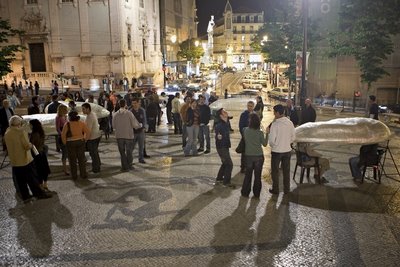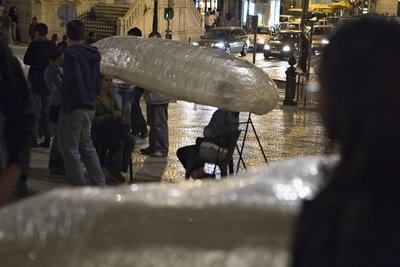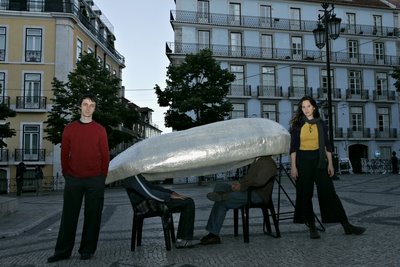|
|---|
Tuesday, May 9, 2006

Wow. The show went just brilliantly well.
Here is what it's all about:
1. Concept. An intimate space in the middle of a busy city. Street art as a space for communication : a stage. Theater in the most unlikely place. But not quite street theater. Not in the sense of puppets and circus acts.
2. Inside. Stories of the homeless. Actual stories, told without any pathetic tones, no moralizing or tear-jerking. The lives, tastes, loves, sleeping choices and favorite football team, of those we avoid most. A confrontation with difference - a private meeting with a stranger.
3. Realization. Five 2,5-meter-long egg-shaped, hallow forms with two holes on the bottom. Ten chairs.
4. Material. Scotch tape. At least 95% of the "performative helmets" were made with transparent scotch tape. Some also had a little resin and 2-3 layers of transparent film. The holes and the tips were reinforced with wire.
5. Experience. It's night. People go out to have a few drinks. As you approach one of the city's busier squares, on it you see several strange, large shapes that look like sculptures. There are people gathered around it. You come closer and notice there are legs sticking out underneath the sculptures. Actually, those are two people sitting with this thing on their head. Bewildered, you approach one of the production people. S/he says: "This is a performance that's part of the FATAL academic theater festival. One of the people inside is a performer and the other is a spectator. If you wait a little, you can try it. It lasts about 5 to 10 minutes and is free." You wait, then sit on the spectator's chair. The helmet is put on your head. You are isolated from the rest of the world. The sound changes completely - it hushes. But also visually, you have nowhere to run - all you see is the face of a young person. A head completely cut away from the rest - including the body. The person looks at you. S/he starts talking. You have been told to remain silent, so you just enjoy the ride. She talks in the first person, telling you about how she ended up on the street, who his parents were, and why the bakery window is the best place to spend the night. She speaks calmly, with no rush. It doesn't really sound like a theater monologue, but more like just someone telling his story.
6. Joker. The joker is another type of experience in the performative helmet. What you hear, then, is not a story. The performer describes a face. She speaks as if she were describing her own face. But after a while you realize she is actually describing your own face. Neutrally, without judging. Simply telling you exactly how your face looks to her.
The performance went on for three nights, between 11PM and 2AM. We had spectators non stop, often with big lines of people waiting. The performers gave their individual performances about 250 times, which was the maximum they could. Nearly a thousand people stopped to watch the performance as an installation and read the flyer we gave them (many more were watching from across the street). 90% of the "inside" spectators came out very impressed and enthusiastic about the project (needless to say some of them are theater-goers, but many others would never consider going to theater). Many people waited in all the lines to go through all of the performative helmets, since the story was different in each of them. There were a lot of smiling faces. There were tears. A young homeless punk who first wanted to ridicule the event, after hearing two stories asked one of the perfomers if they could change sides - which they did, and the punk told her life story. She asked the perfomer to keep the story as a secret between them.
Now, we are all exhausted. It was very intensive, with nearly none production support.
But this was so good, it would be a pity too keep it at that. If you know of any festivals/venues that could be interested in this work, let me know. We are now preparing a "festival package", in English, possibly with local performers, street-level research and acting and sculpting workshops.
Me and Performaria co-director Verónica Fernandes next to one of the performative helmets. Inside of it, the person to the right is performing, the one to the left - watching.
photos by José Miguel Soares
Labels: performing, Portugal, sculpture, vvoi's













